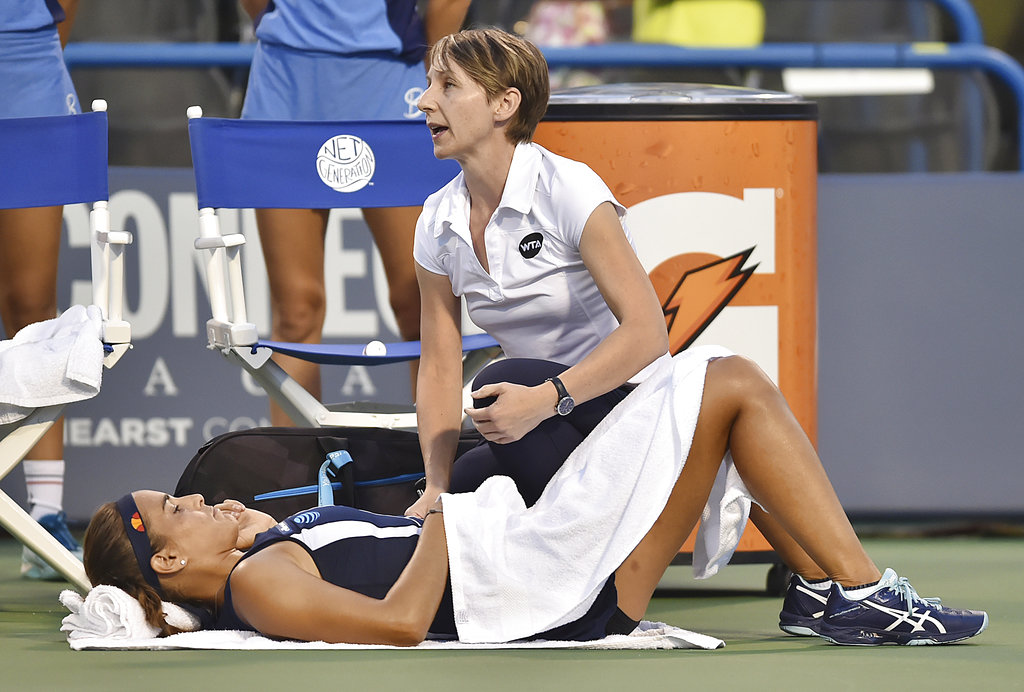
Martina Kehoe, with the WTA, examines Monica Puig, of Puerto Rico, during Puig’s match against Spain’s Carla Suarez Navarro in the semifinals of the Connecticut Open tennis tournament Friday, Aug. 24, 2018, in New Haven, Conn. Puig withdrew from the match in the first set. (Catherine Avalone/New Haven Register via AP)
NEW HAVEN, Conn. — Connecticut Open tournament director Anne Worcester heard the same story over and over last week from top players who had committed to her event, the final WTA tuneup before the U.S. Open.
They had an injury or an illness and while it was nothing serious, with the major in New York coming up … well, you understand.
Worcester believes it’s time for the WTA to look at its rules and its schedule and consider making some changes to better serve the tournaments that want to put on a good show, the fans who spend money to see top players and the players who are often stretched too thin over an 11-month season.
“It’s not just our week, the week before the U.S. Open,” she said. “If you look at the women’s tennis tour, especially this summer, there have been too many withdrawals and retirements.”
The problem was acute in New Haven. The tournament lost top seed Simona Halep, who withdrew on Monday after playing in two consecutive finals. The official reason was a sore right Achilles.
“It’s tough to make this decision,” Halep said. “But I have to. I have to rest.”
Sixth-seeded Ashleigh Barty, seventh-seeded Kiki Bertens — who won just days before in Cincinnati — and Johanna Konta all withdrew, citing a virus.
Others tried, but couldn’t make it through the week. American CoCo Vandeweghe, who like Halep received a wild card into the tournament, retired from her first-round match with an ankle injury. Three-time champion and third-seeded Petra Kvitova made it to the quarterfinals before leaving after one set with a sore shoulder. Reigning Olympic champion Monica Puig left her semifinal match after eight games with an abdominal strain.
As a result, Carla Suarez Navarro made it to Saturday’s final while completing just one full match and fewer than four sets.
Worcester said she believed all of those who dropped out wanted to play and were not making frivolous decisions. Many top players prefer not to play at all the week before a Grand Slam, and those that do tend to be cautious with anything that could prevent them from playing for the bigger title, prize money and prestige.
All those who dropped out of New Haven, where the champion receives just over $136,000, are expected to play in New York, where players earn $20,000 more than that just for winning two singles matches.
Worcester said the real issue is the WTA’s circuit structure and long season.
In addition to the majors, the WTA has four Premier Mandatory events: Indian Wells, Miami, Madrid and Beijing. A player must also compete in four of the Premier 5 tournaments — Doha, Rome, Wuhan, Montreal and Cincinnati — and two of 12 other premier events, of which New Haven is one.
That would be fine, Worcester said, if they weren’t also being drawn into so many other smaller tournaments around the world. That, she said, results in tired and injured players who end up missing or dropping out of premier-level events.
“We have too many international-level tournaments on the WTA Tour, with a play-down rule that is nowhere near as strong as it needs to be,” she said. “Players should only be allowed to play down to that international level in very specific, discrete situations and right now it’s too easy for too many top-10 players to play down.”
Worcester said she’s been told the WTA may add a couple more premier-level dates earlier in the summer, which could allow Connecticut to move away from the week before the U.S. Open.
She’d also like to find a structure that would allow top players who play deep into one tournament the ability to get an extra day of rest before the next tournament. That would mean adjusting the size of the main draw to allow more byes.
The WTA, asked to respond to the criticism, issued a statement saying it is always willing to look at changes that will make the tour better.
“It is disappointing when withdrawals occur as the players want to compete and we want our fans to be able to count on seeing their favorite stars at their local tournaments,” the organization said. “We are confident that our calendar allows players to commit to a schedule that best suits their individual needs and goals while delivering an exciting product to our fans.”
___